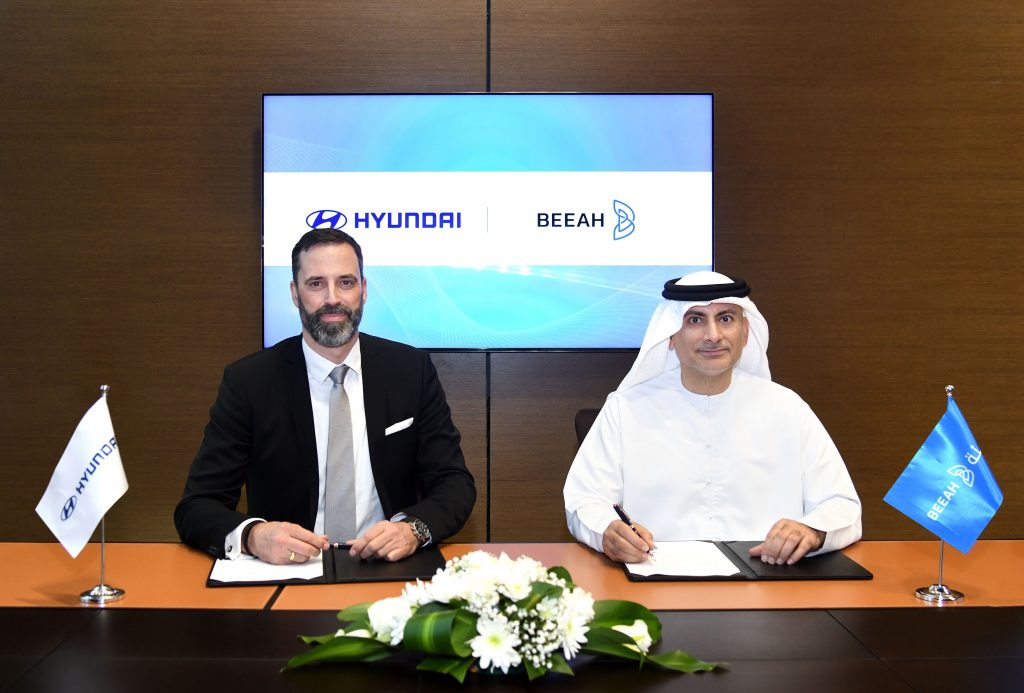Hyundai Motor Company signed a memorandum of understanding (MOU) with BEEAH Group (BEEAH) to promote a hydrogen mobility demonstration project in the United Arab Emirates and explore further opportunities for collaboration.
BEEAH is the pioneer for sustainability and digitalization in the Middle East, integrating zero-waste, waste-to-energy and net-zero innovations to drive industries towards sustainability targets. As part of its waste management business, the Group operates a fleet of over 2,000 waste collection vehicles, including electric cars. In alignment with the UAE’s hydrogen strategy, the Group is exploring hydrogen fuel vehicles to decarbonize its fleet operations and to advance emissions-free mobility for future-ready cities.
Hyundai Motor and BEEAH have agreed to cooperate in a fuel cell electric truck demonstration project, which is planned to be conducted in the emirates of Sharjah and Dubai, UAE. The two parties will also collaborate on technological services and human resources and explore further opportunities along the hydrogen value chain using Hyundai Motor’s technology and experience.
As part of the demonstration project, Hyundai Motor will provide a fuel cell electric truck to BEEAH Group to utilize the vehicle in normal day-to-day truck operations. Parties aim to confirm the feasibility of Hyundai Motor’s fuel cell electric truck in the United Arab Emirates under actual usage conditions to consider replacing traditional Internal Combustion Engine (ICE) truck fleets later.
Launched in 2020, XCIENT Fuel Cell is the world’s first mass-produced fuel cell electric heavy-duty truck. Currently, the car is deployed in six countries, especially in Switzerland, where the 49 trucks have accumulated over 8 million km. The model used for the demonstration project is a 6×2 cargo truck equipped with two 90 kW hydrogen fuel cell systems (total 180 kW power) and a 350 kW e-motor. Its gross combination weight is a maximum of 42,000 kg and offers a driving range of over 400 km per charge even when fully loaded.
Hyundai Motor has been focusing on hydrogen for 25 years. XCIENT Fuel Cell implements the world-leading hydrogen fuel cell system offered by HTWO, Hyundai Motor Group’s hydrogen business brand. The Group is expanding its fuel cell business globally, covering various sectors, including passenger and commercial vehicles, marine vessels, aerospace applications, power generation and more.
“We are delighted to support BEEAH’s strong commitment to elevating the quality of life in the United Arab Emirates by offering concrete sustainability solutions. The Hyundai XCIENT Fuel Cell truck is the first hydrogen-powered truck in the UAE and will undergo several tests under real conditions. This trial run will be the first milestone in a long-term partnership between the Hyundai Motor Company and BEEAH Group. We are currently exploring further areas of collaboration,” said Mark Freymueller, Senior Vice President and head of Global Commercial Vehicle Business at Hyundai Motor Company.
“Hydrogen is a promising alternative to traditional fuel as cities enhance transport connectivity and transition to zero-emissions mobility. We are excited to collaborate with Hyundai and explore ways to apply its technologies for on-ground use cases within our fleet operations so that we may demonstrate the tangible, positive impact and potential of hydrogen to shape zero-emissions transport networks and achieve net-zero targets,” said Khaled Al Huraimel, Group CEO of BEEAH.
BEEAH Group has set industry benchmarks for sustainable waste management in the Middle East, leveraging cutting-edge technologies and innovative, end-to-end integrations to achieve 90% landfill waste diversion in Sharjah, the highest in the region. By recovering materials and introducing them into the circular economy, BEEAH has helped save hundreds of thousands of tonnes of emissions. BEEAH is now looking to further support regional sustainability targets, particularly in the UAE, by exploring hydrogen to decarbonize its fleet operations,
Leading up to COP28 in 2023, the United Arab Emirates established the “National Hydrogen Strategy 2050”, demonstrating the nation’s plans to position itself as a producer and supplier of hydrogen by 2031. As part of this strategy, the UAE forecasted that low-carbon hydrogen demand would reach 2.7 million tons per year by 2031, with hydrogen mobility being one of the off-takers of this demand. Through these initiatives, the UAE aims to demonstrate its commitment to utilizing cutting-edge technologies and innovations to achieve net zero by 2050.
Hyundai Motor has consistently been at the forefront of driving the energy transition within the Middle East region. Their initiatives began with successfully exporting two ELEC CITY Fuel Cell buses and one XCIENT Fuel Cell truck to Saudi Arabia in 2020. The Group is actively seeking business opportunities in the region by testing product feasibility through numerous tests, such as extreme weather testing, and developing public-private partnerships to establish a hydrogen economy.

